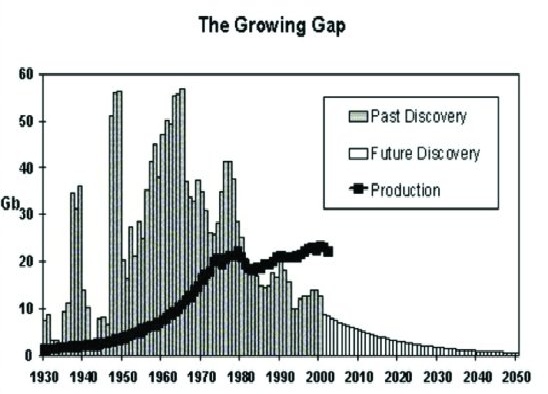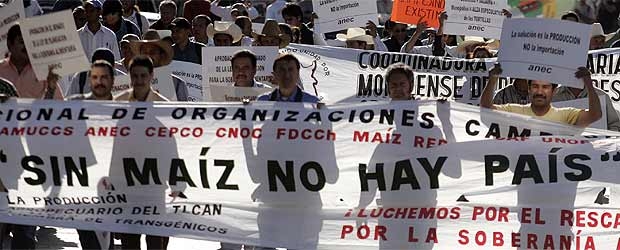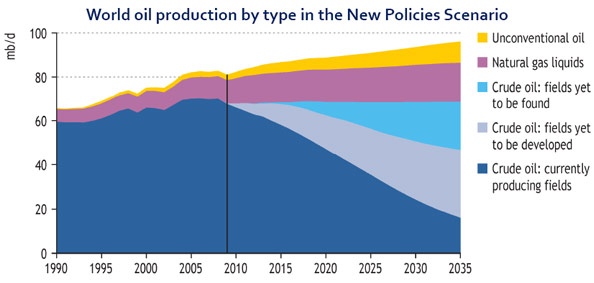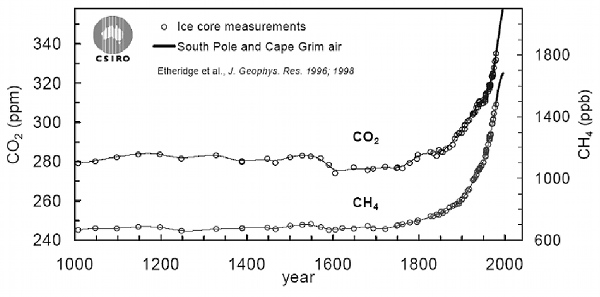Home About News Courses Design Projects Resources Contact
What is peak oil and climate change and how do they relate to food?
Peak Oil
Peak oil is the point of maximum production of oil globally. From that point on oil production plateaus and then declines. Cost of oil and oil related products such as natural gas and biofuel increase with increasing demand and stable or declining supply. Without a major global economic downturn or even collapse, the cost oil and related services and products will continue to rise.
 Oil discoveries peaked in the 60's, production is now following
Oil discoveries peaked in the 60's, production is now following
As the price of peak oil increases it increases the costs associated with conventional farming and the costs of transporting food to the point of sale. It is estimated that fuel accounts for around 4% of farm production costs. Others estimate that for every calorie of food being eaten that 12 calories of oil energy are invested into its production or transport.
 People protest in Mexico in 2008 as corn prices increase 700%. The sign reads "Without Maize there is no Country"
People protest in Mexico in 2008 as corn prices increase 700%. The sign reads "Without Maize there is no Country"
However some people seem intent on convincing themselves there is not a problem. Despite years of denial around peak oil, the International Energy Agency admited in 2010 that concentional production of oil peak in 2006, however they seek to paint a more postive picture of the future than is likely in the graph below, with the IEA predicting another 25 years before the decline starts. It is unlikely that their assumptions on undiscoverred oil and unconventional oil that underpin this graph are correct.

Interestingly a figure I seem to recall on a radio documentary about old Australia prior to motor vehicle transport was that around 1/3 of all people (could be wrong here) were directly involved in transport (rearing horses, growing food for them, making carriages or saddles or the raw materials for such or driving, or unloading, or involved in shipping.).
Climate Change
 Greenhouse gases, that trap heat around the earth, jumped in concentration after the industrial revolution due to fossil fuel burning, land clearing, population increase, and agriculture.
Greenhouse gases, that trap heat around the earth, jumped in concentration after the industrial revolution due to fossil fuel burning, land clearing, population increase, and agriculture.
Climate change is one of the phrases used to describe the effect of increasing average global temperatures resulting from human caused release of greenhouse gases. The warming impacts on the earth's climate systems, weather and ecological systems. Sadly the changes to local weather are becoming more severe around the world and this is impacting on food production through a combination of drought, floods, storms, fires, freezes and shifting seasons.
 Critical climate stablisation systems are already failing faster than expected. The doted line shows likely projection of melting based on actual observations.
Critical climate stablisation systems are already failing faster than expected. The doted line shows likely projection of melting based on actual observations.
We have already seen a number of significant climatic events affecting food production:
- 2006 Pacific Cyclone Larry - large proportion of the Queensland Banana crop was destroyed resulting in a 250% increase in banana prices.
- 2008 Australia Drought - 98% reduction in Australia rice crop constituting 10% of the global crop resulting in a 50% increasing in global rice prices, and a loss of food for 20 million people.
- 2008 China Freeze - a historic freeze kills millions of livestock and forces food prices to rise.
- 2010 Russian Heatwave - one the world biggest exporters, bans wheat export after drought and massive wildfires cut their harvest, combined with a rotting India stockpile that could feed 210 million people for a year, global wheat prices rise.
- 2011 Pacific Cyclone Yasi - major damage of Queensland banana and sugar crops - $500 million in damage to sugar crops and a 30 year high in sugar prices.
- 2011 Mexico Freeze - 80-100% of crops destroyed over major food growing areas.
These events will only get worse and more frequent until we can reduce levels of atmospheric carbon dioxide and methane.
See Target 300 for more information on climate change.
>Home >Resources >Fact Sheets >Climate Change and Oil Peak and their impact on food

